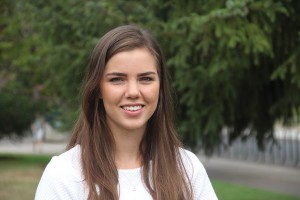 Natural Sciences
Natural Sciences
Getting Over It
 Science intimidated Alia Mowery when she entered the University of Oregon. But it was a closed door, not a locked one.
Science intimidated Alia Mowery when she entered the University of Oregon. But it was a closed door, not a locked one.
Mowery (right) broke through when she found a research topic that fascinated her: new mothers and an enhanced ability to learn. Now Mowery sees more than the mere value of science—she sees her future in it.
She grew up homeschooled in Eugene, and science “had been a big gaping hole” in her education, she said. “I did not think I wanted to do anything at all in science or research.”
But then Mowery connected with psychology professor Dare Baldwin, who happens to be a family friend and studies language and cognitive development in infancy and early childhood. Seeking a topic for her senior thesis in the Clark Honors College, Mowery (left) approached Baldwin about the possibility of joining a research project in her lab.
Baldwin had been pondering an intriguing theory: do breastfeeding mothers have a predisposition for learning because of high hormone levels? That notion had surfaced in studies involving mice, Baldwin said, “but no one had yet applied this idea to humans.”
Mowery jumped at the opportunity to explore a scientific topic that moved her. In addition to scouring the academic literature for research on the subject, she taught herself how to write the computer code necessary for conducting online tests to examine the theory.
On the question of learning capacity, Mowery and lab colleagues examined how new mothers who breastfeed their babies compare with new mothers who do not, as well as with nonmothers.
The tests involved various object-recognition exercises that tapped different learning and memory systems of the brain. In one test, subjects heard a list of words, and then typed in as many as they could remember. In another, they watched a video showing shapes presented in various sequences; they then identified which sequences emerged most often.
“We were looking to see if new mothers would score higher on any or all of these tasks,” Mowery said.
The tests are part of a broader project that is still in its infancy, so to speak. It’s too soon to say how well mothers performed on the tests because Baldwin’s lab group is still analyzing the data.
According to Baldwin, if the performance by mothers proves to be above the norm, it will suggest a correlation between motherhood and enhanced learning, and future research could then consider if hormone activity during pregnancy and breastfeeding plays a role in a period of enhanced learning ability.
“The biggest contribution we’ve made is the gathering of evidence that shows that our topic is worth looking into,” Mowery said. “I don’t think people have really considered the potential for an enhanced period of learning during early motherhood.”
Doing research, Mowery said, made her more invested in her education. It’s also helped her view science in an entirely new light.
Consider this: a homeschooled child who didn’t focus on science—the same one who felt intimidated by the idea of research when she arrived at the UO—now plans to make a career out of it. Having graduated in June, Mowery is off to Oregon Health and Science University to study medicine.
“(Research) allowed me to develop relationships with professors that I wouldn’t have had otherwise, to plug into the university and feel connected in a much more active way,” Mowery said. “It gave me a really good appreciation for what goes on behind the scenes of what I was learning.”
—By Jim Barlow


 Twitter
Twitter Facebook
Facebook Forward
Forward